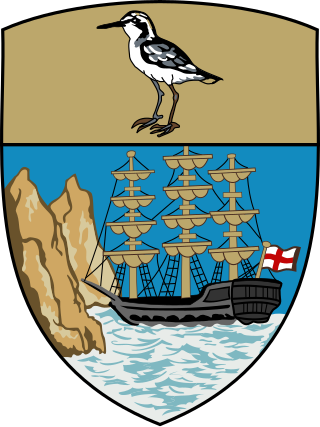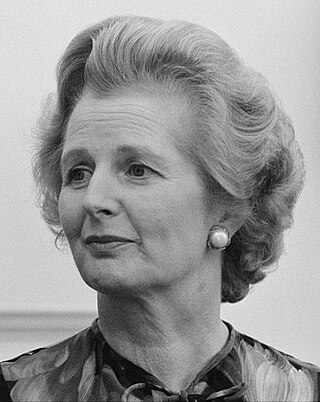Related Research Articles

Saint Helena is a British overseas territory located in the South Atlantic Ocean. It is a remote volcanic tropical island 1,950 kilometres west of the coast of south-western Africa, and 4,000 kilometres (2,500 mi) east of Rio de Janeiro in South America. It is one of three constituent parts of the British Overseas Territory of Saint Helena, Ascension and Tristan da Cunha.
Saint Helena has a known history of over 500 years since its recorded discovery by the Portuguese in 1502. Claiming to be Britain's second oldest colony, after Bermuda, this is one of the most remote settlements in the world and was for several centuries of vital strategic importance to ships sailing to Europe from Asia and South Africa. Since the early 19th century, the British occasionally used the island as a place of exile, most notably for Napoleon Bonaparte, Dinuzulu kaCetshwayo and over 5,000 Boer prisoners.

Politics of Saint Helena takes place in a framework of limited self-government as a dependent territory of the United Kingdom, whereby the governor is the head of government. Saint Helena, an island in the southern Atlantic Ocean, is a part of the British overseas territory of Saint Helena, Ascension and Tristan da Cunha.

The economy of Saint Helena is based on export income from coffee, tourism, fishing, and sales of alcoholic liqueurs. Unemployment is very low in Saint Helena; the February 2016 Census stated that 76 people declared that they were unemployed compared to an economically active population of 2,539 and a total population of 4,534. Saint Helena is one of four countries which depend on financial assistance from the United Kingdom, which amounted to about £22.5 million in 2016–17. This supplements the £12.6 million raised from local tax revenues.

The 1979 United Kingdom general election was held on Thursday 3 May 1979 to elect 635 members to the House of Commons.

The British Overseas Territories (BOTs), also known as the United Kingdom Overseas Territories (UKOTs), are fourteen territories with a constitutional and historical link with the United Kingdom. They are the last remnants of the former British Empire and do not form part of the United Kingdom itself. The permanently inhabited territories are internally self-governing, with the United Kingdom retaining responsibility for defence and foreign relations. Three of the territories are inhabited, chiefly or only, by a transitory population of military or scientific personnel. All but one of the rest are listed by the UN Special Committee on Decolonization as non-self-governing territories. All fourteen have the British monarch as head of state. These UK government responsibilities are assigned to various departments of the Foreign and Commonwealth Office and are subject to change.

The 1964 United Kingdom general election was held on Thursday 15 October 1964, five years after the previous election, and thirteen years after the Conservative Party, first led by Winston Churchill, had regained power. It resulted in the Conservatives, led by the incumbent Prime Minister Alec Douglas-Home, narrowly losing to the Labour Party, led by Harold Wilson; Labour secured a parliamentary majority of four seats and ended its thirteen years in opposition. Wilson became the youngest Prime Minister since Lord Rosebery in 1894. To date, this is also the most narrow majority obtained in the House of Commons with just 1 seat clearing Labour for a majority government.

Ralph Everard Gonsalves is a Vincentian politician. He is currently the Prime Minister of Saint Vincent and the Grenadines, and leader of the Unity Labour Party (ULP).

The flag of Saint Helena consists of a Blue Ensign defaced with the shield from the British overseas territory's coat of arms. Adopted in 1984 shortly after the island was granted a new coat of arms, it has been the flag since. Saint Helena's flag is similar to the flags of eight other British Overseas Territories, which are also Blue Ensigns with their respective coats of arms.
The National Enterprise Board (NEB) was a United Kingdom government body. It was set up in 1975 by the Labour government of Harold Wilson, to support the government's interventionist approach to industry. In 1981 the Conservative government of Margaret Thatcher, combined the NEB with the National Research Development Corporation (NRDC) to form the British Technology Group.
The Saint Helenapound is the currency of the Atlantic islands of Saint Helena and Ascension, which are constituent parts of the British Overseas Territory of Saint Helena, Ascension and Tristan da Cunha. It is fixed at parity with sterling, and so both currencies are commonly accepted and circulated within Saint Helena. It is subdivided into 100 pence.

Compass is a British centre-left pressure group, aligned with the Labour Party which describes itself as: "'An umbrella grouping of the progressive left whose sum is greater than its parts". Like the formally Labour-affiliated think tank the Fabian Society it is a membership-based organisation and thus seeks to be a pressure group and a force for political organisation and mobilisation.

Monarchy was the prevalent form of government in the history of Africa, where self-governing states, territories, or nations of supreme power resides with an individual who is recognized as the head of state. All are similar in that the sovereign inherits their office and typically keeps it until their death or until their abdication. However, only three are currently sovereign, while the remaining are sub-national monarchies. Two of these are constitutional monarchies, in which the sovereign is bound by laws and customs in the exercise of his or her powers, and one is an absolute monarchy (Eswatini), in which the sovereign rules without bounds. The sub-national monarchies are not sovereign and exist within larger political associations, such as the Ashanti of Ghana, Benin of Nigeria, and the Xhosa and Zulu of South Africa. In addition to these, there are also three dependencies of two European monarchies—Saint Helena, Ascension and Tristan da Cunha of the United Kingdom and the Canary Islands and Ceuta and Melilla presently of Spain.
The Socialist Party of British Columbia (SPBC) was a provincial political party in British Columbia, Canada, from 1901 to 1905. In 1903, the SPBC won seats in the Legislative Assembly of British Columbia.

The following outline is provided as an overview of and topical guide to Ascension Island:

The following outline is provided as an overview of and topical guide to Saint Helena:

Ascension Island is an isolated volcanic island, 7°56′ south of the Equator in the South Atlantic Ocean. It is about 1,000 miles (1,600 km) from the coast of Africa and 1,400 miles (2,300 km) from the coast of South America. It is governed as part of the British Overseas Territory of Saint Helena, Ascension and Tristan da Cunha, of which the main island, Saint Helena, is around 800 miles (1,300 km) to the southeast. The territory also includes the sparsely populated Tristan da Cunha archipelago, 2,300 miles (3,700 km) to the south, about halfway to the Antarctic Circle.
The Saint Helena Progressive Party was a political party on the island of Saint Helena. The party favoured retaining economic links with the United Kingdom.
Sir Thomas Oates, CMG, OBE was a British colonial administrator. He was Governor of Saint Helena from 1971 to 1976.

General elections were held in Saint Helena in September 1976. They were the only elections on the island to have been contested by political parties, with the Saint Helena Progressive Party winning eleven of the twelve seats in the Legislative Council. The Saint Helena Labour Party had seen its leader Tony Thornton expelled from the island shortly before the election, and failed to win a seat.
References
- 1 2 3 4 5 Aldrich, Robert, and John Connell. The Last Colonies . New York: Cambridge University Press, 1998. p. 138
- 1 2 3 Day, Alan J., and Henry W. Degenhardt. Political Parties of the World: A Kessing's Reference Publication . Harlow: Longman, 1980. p. 360
- ↑ Nohlen, Dieter, and Franz Nuscheler. Handbuch der Dritten Welt 5, Ostafrika und Südafrika, Bonn: J.H.W. Dietz Nachf, 1993. p. 527
- ↑ St Helena, Hansard , Volume 826: debated on Tuesday 16 November 1971
- 1 2 3 Africa Confidential, Volume 16, Miramoor Publications Limited, 1975, pages 9-10
- ↑ The Europa Year Book 1984: A World Survey . London: Europa Publications, 1984. p. 1264
- 1 2 The World Factbook, Central Intelligence Agency, 1986, page 210
- 1 2 The Islander, Thursday 21 December 2000
- 1 2 3 Cohen, Robin. African Islands and Enclaves , Beverly Hills, Calif. [usw.]: Sage Publ, 1983. pp. 127–128
- ↑ The St. Helena Independent. The St Helena Manifesto, 1975 Archived 29 September 2011 at the Wayback Machine
- ↑ Small Island Economies, Robin Cohen, University of Manchester, Department of Administrative Studies, 1983, page 9